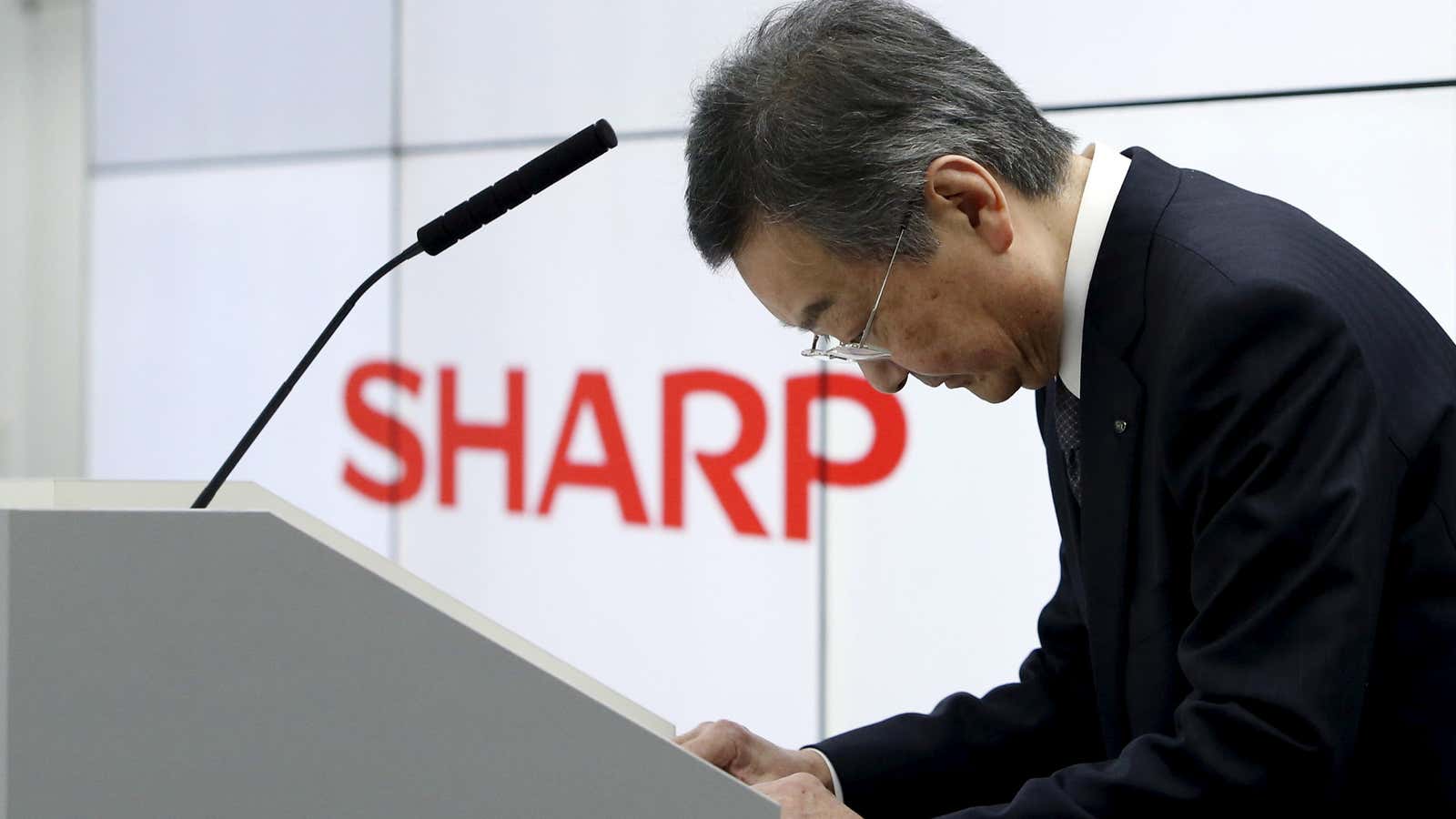Japan’s Sharp Corp. was once a valuable asset being fought over by a rich foreign firm and a group of state-backed competitors. Now, just days after a $5.8 billion offer from Foxconn Technology Group was tabled then yanked hours later, Sharp’s future is anyone’s guess.
Investors are losing patience—and potentially billions of dollars in value—as Sharp and Foxconn work toward a new March 7 deadline to salvage the deal. Sharp’s stock price has fallen 25% since the deal fell apart last Thursday (Feb. 25).
How could a politically sensitive, multibillion-dollar deal that has been in the works for months—between companies that have been in deal talks for years—have fallen apart at the last minute?
Much of the blame should be attributed to the advisers to both sides, deal experts say. As with most corporate mergers, Foxconn and Sharp each signed on teams of veteran bankers and lawyers who have been working overtime to evaluate the real value of Sharp’s business, negotiate the nitty-gritty financial details, and ensure that the melding of two very different companies starts smoothly.
Foxconn enlisted law firm Baker & McKenzie and investment bank JPMorgan Chase. Sharp is represented by Mizuho Securities and Mitsubishi UFJ Morgan Stanley Securities, one person briefed on the advisers told Quartz. Mizuho and JPMorgan did not respond to requests for comment, while Baker & McKenzie and Mitsubishi declined to comment.
Despite all this high-powered advice, Foxconn reportedly got cold feet after a 100-point list of potential contingent liabilities, amounting to 350 billion yen ($3.1 billion), mysteriously emerged (paywall) at the last minute, according to the Wall Street Journal. Reuters reports, on the other hand, that the list was an “unverified study of worst-case scenario risks,” rather than concrete liabilities that needed to be disclosed.
The fact that the two companies appear to be hashing out their grievances through conflicting leaks to the press is another sign of how troubled communications between the deal advisers have become.
“It’s amazing such a huge potential $3 billion liability only came to the surface now,” one veteran financial PR executive in Asia told Quartz. “Clearly the due diligence doesn’t seem to have been done very diligently!” The situation raises two questions, she added: “What else hasn’t Sharp disclosed? Or, is this Foxconn finding an excuse to bail last minute?”
Poor communication between the two companies seems to have been a constant. Foxconn asked Sharp’s board to delay voting on the deal because of the list, and Sharp “simply ignored Foxconn” and announced a deal, Reuters reports today (March 1).
Deal talks continue.“There is a commitment to it. People are actively engaged and looking at the new information,” another person briefed on the negotiations told Quartz. She characterized the last minute information as a list of worst-case scenarios as well, rather than “actual liabilities that are fixed.”
Despite the bad blood, Sharp has few other options but to appease Foxconn and get a deal done.
INCJ, a government-backed investment team that had also bid for Sharp, has already dissolved its deal team, one person told the Wall Street Journal (paywall), and isn’t expected to come back to the table.
Sharp has struggled to adapt its business to the present day, and TV sales are declining as hardware competition from China increases. Last year alone Sharp lost about $2 billion.
On Feb. 29, Sharp appointed Toshihiko Fujimoto, an internal executive, to the new role of “head of strategic alliance.” He will lead Sharp’s negotiations with Foxconn and oversee their subsequent cooperation, a Sharp spokesman said, and hopefully succeed where advisers have failed.
